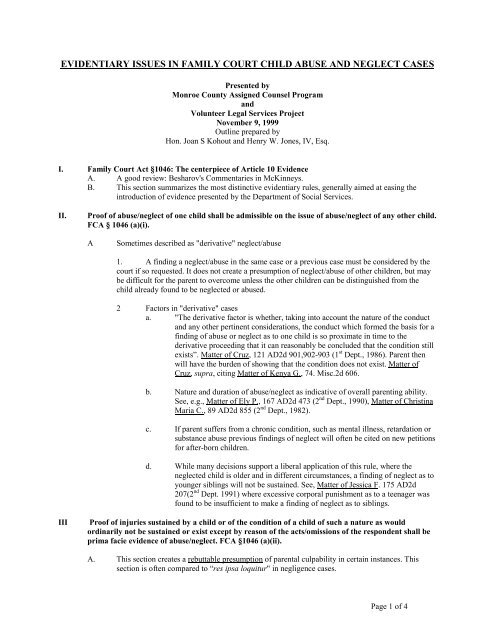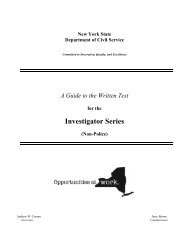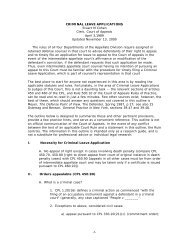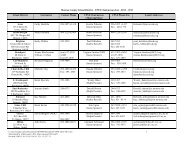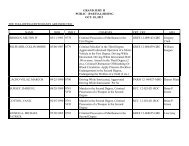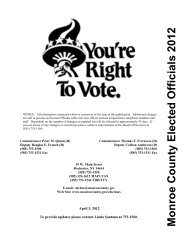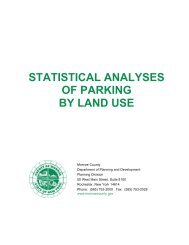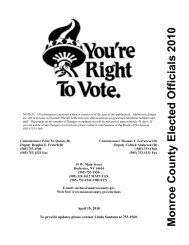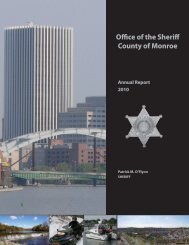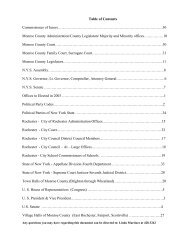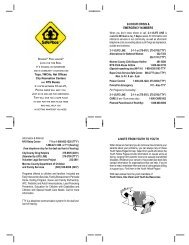evidentiary issues in family court child abuse and ... - Monroe County
evidentiary issues in family court child abuse and ... - Monroe County
evidentiary issues in family court child abuse and ... - Monroe County
Create successful ePaper yourself
Turn your PDF publications into a flip-book with our unique Google optimized e-Paper software.
source <strong>and</strong> the public <strong>in</strong>terest outweighs the potential <strong>in</strong>jury to the patient <strong>and</strong> the patientphysicianrelationship <strong>and</strong> the facility. 42 CFR §2.64(d).B. This section does not apply to records of private physicians, who are not employed by an agencyor hospital. In those cases, the bus<strong>in</strong>ess record provisions of CPLR §4518 would apply.C. Best practice is to submit volum<strong>in</strong>ous records to opponent(s) <strong>in</strong> advance. See, Matter of Leon RR.,48 NY2d 117 (1979) which addressed admissibility of a large Social Services Agency file.D. Entries <strong>in</strong> the records may be objectionable if they are not made <strong>in</strong> the ord<strong>in</strong>ary course of bus<strong>in</strong>ess,the writer was not under a bus<strong>in</strong>ess duty to keep the records or the <strong>in</strong>formation recorded wasprovided by a person who had no bus<strong>in</strong>ess duty to impart it. Matter of Leon RR, 48 NY 2d117,122-123; see also, Dept. of Soc. Services v. Waleska M., 195 AD2d 507 (2 nd Dept 1993).E. Maker's lack of personal knowledge affects weight but not admissibility. FCA §1046 (a)(iv).F. Expert op<strong>in</strong>ions appear<strong>in</strong>g <strong>in</strong> the records are admissible even <strong>in</strong> the absence of a description of thebasis for the op<strong>in</strong>ions or the expert's qualifications. Matter of Harvey U., 116 AD2d 351 ( 3 rd Dept.1986).VIReports filed with the statewide central register of <strong>child</strong> <strong>abuse</strong>/maltreatment by a m<strong>and</strong>ated reporterunder Social Services Law §413 are admissible. FCA §1046 (a) (v).A. Generally these reports are submitted for the fact that they were made, not the truth they conta<strong>in</strong>.If the report is be<strong>in</strong>g offered as proof that its contents are true, it may be subject to redaction.VII.Previous statements by the <strong>child</strong> relat<strong>in</strong>g to the alleged <strong>abuse</strong>/neglect shall be admissible but ifuncorroborated shall not be sufficient to make a f<strong>in</strong>d<strong>in</strong>g of <strong>abuse</strong>/neglect. Corroboration may consistof any other evidence tend<strong>in</strong>g to support the reliability of the statement. FCA §1046 (a)(vi).A. Child's hearsay statements may also be admissible if they are otherwise exceptions to the hearsayrule.1. See eg., Matter of Lydia K., 112 AD2d 306 (2 nd Dept. 1985), aff'd., 67 NY2d 681(1986)[spontaneous utterance]2. No <strong>in</strong>dependent show<strong>in</strong>g needed, as <strong>in</strong> crim<strong>in</strong>al cases, that <strong>child</strong> would otherwise becompetent to testify. c.f., People v. Sullivan, 117 AD2d 476 (3 rd Dept. 1986), Matter ofCarol Ann D., 195 AD2d 460 (2 nd Dept. 1993).B. Corroboration may be provided by:1. Child's unsworn <strong>in</strong> camera testimony, if materially consistent without-of-<strong>court</strong> statements<strong>and</strong> subject to cross-exam<strong>in</strong>ation. Matter of Christ<strong>in</strong>a F., 74 NY2d 532 (1989).a. Note: Fourth Dept. has held that <strong>child</strong>'s <strong>in</strong> camera testimony needs nocorroboration. Matter of Vanessa R.,148 AD2d 989 (4 th Dept. 1989).2. Admission of respondent. Matter of S<strong>and</strong>ra S., 195 AD2d 1070 (4 th Dept. 1993).a . Admission need not conclusively establish sexual <strong>abuse</strong> to be corroborative.Matter of Karen BB., 216 AD2d 754, 755 (3 rd Dept. 1995).b. Admission which is later recanted may provide corroboration. Matter ofMargaret W., 83 AD2d 557 (2 nd Dept. 1981), lv. denied, 54 NY2d 609.3 Cross-corroboration by hearsay statements of other <strong>child</strong>ren.. Matter of Frances CharlesW., 71 NY2d 112,124 (1988). Matter of C<strong>in</strong>dy J.J., 105 AD2d 189 (3 rd Dept. 1984).4. Proof of the respondent's <strong>abuse</strong> of another <strong>child</strong>. FCA §1046(a) (1).Page 3 of 4
5. Medical proof. See eg., Matter of Joli M., 131 Misc2d 1088 (New York <strong>County</strong>, FamilyCourt, 1986) [pregnancy provided corroboration of sexual <strong>abuse</strong>].6. Child's statements to different persons may not cross-corroborate each other, Matter ofFrances Charles W.,71 NY2d 112,123 (1988) but the consistency of statements made todifferent persons on different occasions may be considered. Matter of Starr H., 156 AD2d1025 (4 th Dept. 1989).C. Expert validation testimony <strong>in</strong> sexual <strong>abuse</strong> cases may provide corroboration. Matter of Nicole V.,71 NY2d 112 (1988).1. A validator is generally a mental health professional] who has expertise <strong>in</strong> sexual <strong>abuse</strong>of <strong>child</strong>ren <strong>and</strong> who testifies that a <strong>child</strong>'s behavior, statements <strong>and</strong> characteristics areconsistent with hav<strong>in</strong>g been sexually <strong>abuse</strong>d. Sometimes the validator will offer anop<strong>in</strong>ion on the identity of the perpetrator. See, Matter of Melissa M., 136 Misc2d 773(Family Ct.,Suffolk Co., 1987).2. Expert need not be psychologist or psychiatrist. McWhirter vs. McWhirter, 129 AD2d1007 (4 th Dept. 1987).3. Testimony concern<strong>in</strong>g the <strong>child</strong>'s overall credibility is generally objectionable. But see,Matter of Br<strong>and</strong>on U.U., 193 AD2d 835 (3 rd Dept. 1993).VII.VIII.CPLR privileges are all waived with the exception of Attorney/Client [CPLR §4503) <strong>and</strong>Clergy/Penitent CPLR §4505) privileges. FCA §1046(a) (vii).Proof of "impairment of emotional health" or "impairment of mental or emotional condition" as theresult of the unwill<strong>in</strong>gness/<strong>in</strong>ability of respondent to exercise a m<strong>in</strong>imum degree of care toward the<strong>child</strong> may <strong>in</strong>clude expert testimony or proof that the impairment lessened dur<strong>in</strong>g a period when the<strong>child</strong> was not <strong>in</strong> respondent's care. FCA §1046 (a) (viii).A. FCA § 1012(h) def<strong>in</strong>es impairment of emotion health <strong>and</strong> impairment of mental or emotionalcondition to <strong>in</strong>cluded such conditions as "failure to thrive"(when an <strong>in</strong>fant fails to ga<strong>in</strong> weight <strong>and</strong>develop normally despite the fact that there are no identified organic causes), self destructiveimpulses, habitual truancy <strong>and</strong> substantially dim<strong>in</strong>ished psychological function<strong>in</strong>g, as long as theimpairment is clearly attributable to the respondent's failures to exercise a m<strong>in</strong>imum degree of caretoward the <strong>child</strong>.B. Comes up often <strong>in</strong> failure to thrive cases, when the agency alleges that the <strong>in</strong>fant ga<strong>in</strong>ed weightwhile <strong>in</strong> the hospital or foster care home, but loses weight while <strong>in</strong> parent's care.IX.Proof of neglect/<strong>abuse</strong> must be based upon a preponderance of the competent, material <strong>and</strong> relevantevidence. FCA §1046 (b).A. The preponderance of the evidence st<strong>and</strong>ard of proof is constitutionally satisfactory. Matter ofTammie Z., 66 NY2d 1(1985).B. If the case proceeds to disposition, the evidence need only be relevant <strong>and</strong> material. FCA § 1046(c).Page 4 of 4


